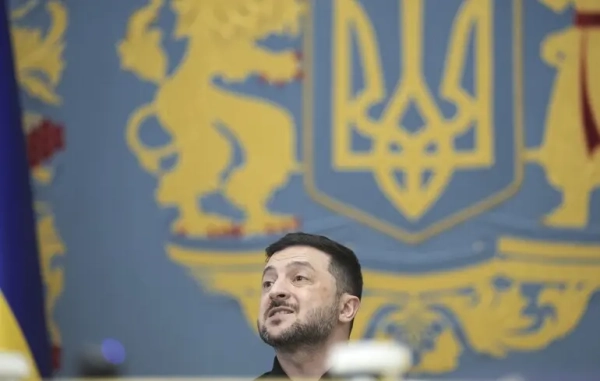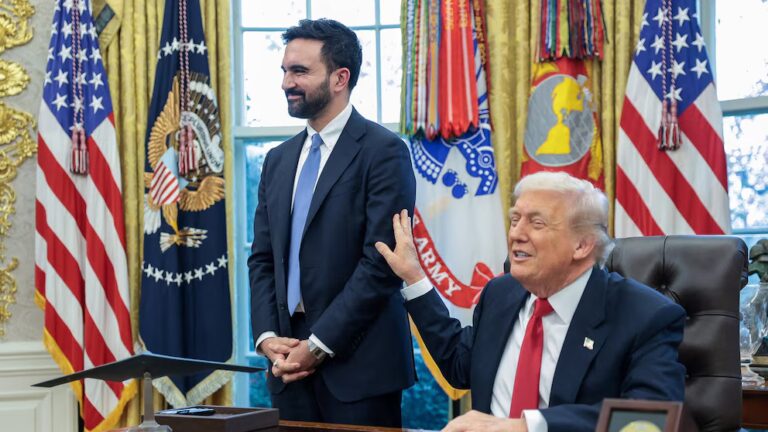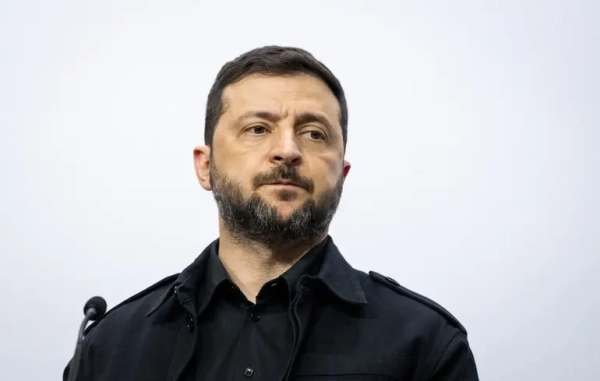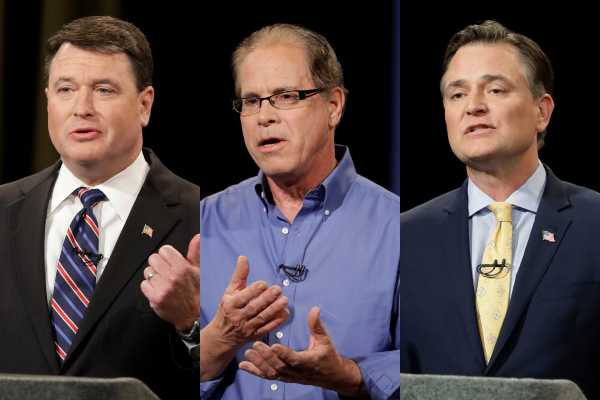
In Indiana, three Republican candidates have already spent more than $9 million running to unseat vulnerable Democrat Sen. Joe Donnelly in what has become one of the most expensive Senate contests this year.
For months, Republicans Reps. Todd Rokita and Luke Messer and business executive and former state lawmaker Mike Braun have been in a bruising contest to out-Trump each other and win the chance to run for Senate in November. They even have Trump-inspired nicknames for each other: “Lyin’ Todd” for Rokita claiming he had received a Trump-Pence endorsement (he hasn’t); “Missing Messer,” attacking the Congress member for spending more time in the Washington, DC, area than in Indiana (complete with an Oh, the Places You’ll Go spoof); and “Tax Hike Mike,” for Braun voting in favor of a gas tax increase as a state lawmaker last year.
“The only thing to differentiate themselves from one another is to throw the mud,” John Zody, Indiana’s Democratic Party chair, said.
They’re fighting for the chance to run against Donnelly, one of the senators in danger in the 2018 midterm election cycle. He’s a Democrat in a state Trump won by 19 points.
But Donnelly is also a moderate, pro-life Democrat without a primary challenger and he remains relatively popular in the state, with a net approval rating of 14 points. Despite coming into office in a major upset (after his opponent said pregnancy from rape is a “gift from God”), he’s selling himself as among the most bipartisan senators in Congress.
Democrats are hoping the nasty Republican primary will play in their favor and mitigate Donnelly’s biggest political disadvantage in the state: having a “D” next to his name.
The Republican race is expensive and very negative
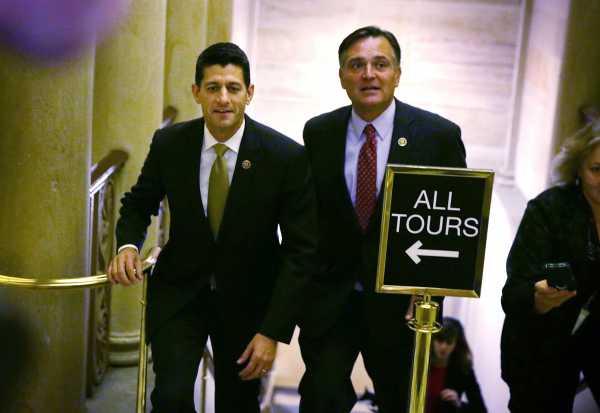
The negativity started early. In August, a week after Rokita announced his Senate bid, Politico published an agonizing eight-page internal memo for Rokita’s staff detailing how to chauffeur him around, raising questions about his character. It was largely perceived to be a piece of opposition research.
Then Rokita attacked Messer’s wife for her $240,000 salary for a part-time job consulting the suburban town of Fishers, Indiana. Messer’s campaign has called Rokita “unhinged.” Rokita’s campaign has since attacked Messer for living mostly in Virginia (Messer’s opening ad was of Messer coaching his son’s basketball team based in Virginia) and for not releasing DUIs from their college days (the two went to college together in the 1990s, a history that election watchers say has fed into this primary dogfight).
Rokita has claimed that Messer “plotted with the Never-Trumpers to steal the nomination from President Trump” in an ad. Then a 2016 interview surfaced showing Rokita calling Trump “vulgar, if not profane.”
Braun, who has outspent the other two candidates by millions, has also waded into the crossfire, and has been attacked for having voted in favor of road funding legislation that increased the state’s gas tax by 10 cents per gallon.
“This race has slowly but surely descended into Dante’s Inferno,” John Hammond III, a Republican National Committee member, told the Associated Press. “It will provide the Democrats an awful lot of free opposition research.”
Braun, who is largely self-funding, has spent about $4.5 million in the race. Messer has spent around $2.9 million, and Rokita is close behind, having spent just over $2.8 million. The total price tag is nearing $10 million.
The three Republican candidates are very similar
But aside from the personal attacks, it’s hard to find a distinguishing factor between the three top Republicans candidates.
“I suppose this is an interesting race, but you have to work hard to find something interesting about the differences between the candidates,” Marjorie Hershey, a political scientist with Indiana University, said.
Rokita is a three-term US House member, who wears Make America Great Again hats in his campaign ads and carries a Trump cardboard cutout to his rallies. He has gained the endorsement of some Trump figures like Rex Early, the Trump campaign’s Indiana state chair, and Tony Samuel, the vice chair.
Messer is a two-term House member who already has a position on Republican leadership as the Policy Committee chair, dedicated to developing the party’s policy platforms. But his campaign has also been mostly void of policy. His opening ad champions “Trump’s agenda” of tax cuts, being anti-abortion, and funding the military.
Braun is perhaps the most distinguishable simply by not being a member of the House — a message he drove home with an ad of two eerily similar-looking cardboard cutouts of Rokita and Messer. A former state lawmaker and business executive, he is in a position to deride Republicans in Congress and paint himself as a political outsider. But his campaign message, although more business-focused, is essentially the same as Rokita’s and Messer’s.
All three are conservative white men with essentially the same message.
“All three are trying to be the Trump heir apparent,” Indiana University political scientist Chera LaForge said. “They are all very conservative, but they are all trying to say, ‘I am the most Trumpian candidate.’”
They’re so eager to be connected to Trump that Rokita’s campaign has already gotten into some trouble with the Trump’s reelection campaign committee, which demanded Rokita remove misleading campaign signs that read “Endorsed by: TRUMP/PENCE” in large letters, only to qualify the statement with “2016 Indiana Team Leaders” in smaller print below.
Donnelly is one of the most vulnerable Democrats in 2018
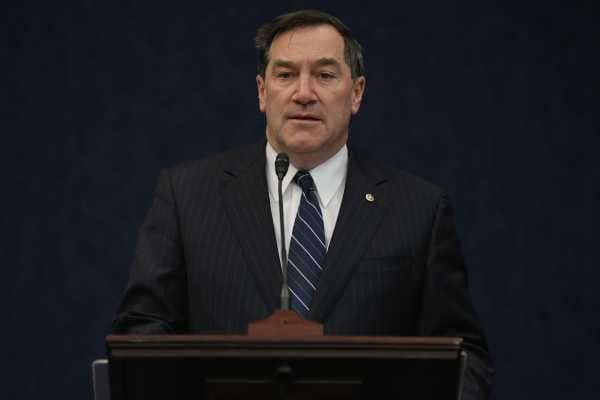
Six years ago Donnelly pulled off a major upset, defeating Republican Tea Party candidate Richard Mourdock, who a month before the election said, “When life begins in that horrible situation of rape, that’s something God intended to happen.”
At the time, the Republican’s loss in the state was largely seen as the result of a bitter GOP primary that moved the party too far to the right. Mourdock had successfully challenged moderate Republican and longtime US Sen. Dick Lugar from the right, turning his 36-year Senate career into a political liability — and Donnelly successfully painted Mourdock as an “extremist,” ultimately winning the election. (It helped that Donnelly was also anti-abortion.)
But a lot has changed since 2012. Indiana is firmly a Trump state.
While other red-state Democrats are getting most of the attention in 2018, election watchers point out that Donnelly is among the most vulnerable Democrats this year.
“When you talk about the most vulnerable people, you always hear Claire McCaskill, Joe Manchin, [Heidi Heitkamp,] and Joe Donnelly always falls in this fourth most vulnerable Democrat,” LaForge said. “In 2012, he won kind of unexpectedly. It’s going to be a very difficult race for him.”
It will be an uphill battle for Donnelly, who will not only have to win the support of all Democrats in the state but also draw in moderate Republicans and independent voters.
Donnelly has largely done his part to paint himself as a bipartisan player in the Senate. He’s one of two anti-abortion Democrats in the Senate. He voted for Trump’s Cabinet nominees early on, breaking with the party to endorse conservative Supreme Court Justice Neil Gorsuch.
He’s supported Trump’s action on trade, and last September he traveled with Trump on Air Force One from Washington, DC, to Indiana for the president’s speech on tax reform. He ultimately didn’t vote for the GOP tax plan, saying Trump broke his promise to help the middle class, which conservative groups like Americans For Prosperity are attacking him for.
In his first ad, Donnelly claims he’s for the “commonsense middle,” attacking Republicans for increasing the national debt and claiming he doesn’t work for either political party.
And in most other ways, particularly when it comes to Trump’s antics, he’s kept a relatively low profile. “He has been trying to stay out of things as much of possible,” LaForge observed. Donnelly’s biggest liability is no secret, and Republicans know it: He’s a Democrat.
“A lot of people don’t realize he’s a Democrat. Some folks just assume because he’s a statewide official that he’s a Republican,” a state GOP operative told RealClearPolitics. “So job number one is making sure people know he’s a Democrat.”
This will be a referendum on Trump
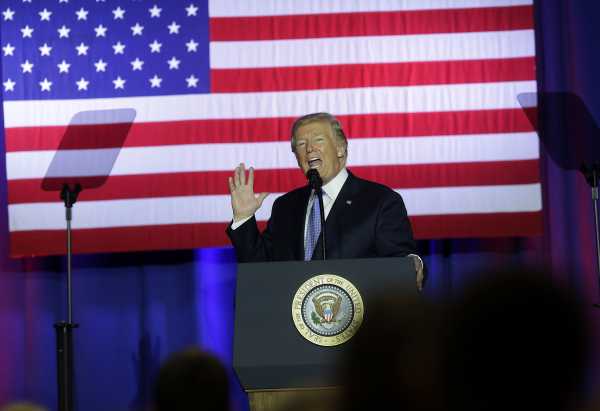
While it’s not surprising that a Republican primary has been a contest to out-Trump the other candidate, that’s a thread that Democrats are expecting will likely continue through the general.
“President Trump won the state by quite a bit, so what we are talking about is what we are for,” Zody said, citing Donnelly’s focus on the opioid crisis, the national debt, and the veterans.
It’s also a race that will test Trump’s economic agenda. Trump won the state with a message that promised to lift up the white working class. But his stronghold in the state has slipped. In the past year, his support has fallen from 55 percent in January 2017 to 48 percent in February 2018, according to a Morning Consult poll.
“Trump’s standing among Republicans has remained extremely high, but the size of that group has reduced,” Hershey said.
In a year when Democrats are enthusiastic to vote, Trump’s slipping numbers and a brutal Republican primary could give Donnelly some hope of clinging to an otherwise fraught seat.
Sourse: vox.com
